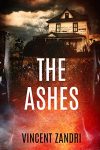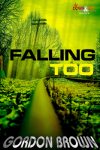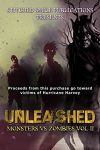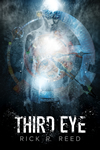

October 30 – November 5: “Horror in thrillers, do they mix and match?”
 This week we’re joined by ITW Members Gordon Brown, Rick R. Reed, Thomas Malafarina, Vincent Zandri and Arthur Kerns as they discuss Horror and thrillers: “Do they mix and match?” Scroll down to the “comments” to read this chilling discussion!
This week we’re joined by ITW Members Gordon Brown, Rick R. Reed, Thomas Malafarina, Vincent Zandri and Arthur Kerns as they discuss Horror and thrillers: “Do they mix and match?” Scroll down to the “comments” to read this chilling discussion!
~~~~~
 Winner of the 2015 PWA Shamus Award and the 2015 ITW Thriller Award for Best Original Paperback Novel for MOONLIGHT WEEPS, Vincent Zandri is the NEW YORK TIMES, USA TODAY, and AMAZON KINDLE No.1 bestselling author of more than 25 novels including THE REMAINS, EVERYTHING BURNS, ORCHARD GROVE and THE CORRUPTIONS. He lives in New York and Florence, Italy.
Winner of the 2015 PWA Shamus Award and the 2015 ITW Thriller Award for Best Original Paperback Novel for MOONLIGHT WEEPS, Vincent Zandri is the NEW YORK TIMES, USA TODAY, and AMAZON KINDLE No.1 bestselling author of more than 25 novels including THE REMAINS, EVERYTHING BURNS, ORCHARD GROVE and THE CORRUPTIONS. He lives in New York and Florence, Italy.
 Gordon Brown lives in Scotland. He has delivered pizzas in Toronto, compered the main stage at a two-day music festival, floated a high-tech company on the stock market and was once booed by 49,000 people while on the pitch at a major football Cup Final. Today, Gordon also runs a creativity training business called Brain Juice and is a DJ on local radio. Gordon helped found Bloody Scotland—Scotland’s International Crime Writing Festival—and has been writing since his teens. He has five crime and thriller novels to his name.
Gordon Brown lives in Scotland. He has delivered pizzas in Toronto, compered the main stage at a two-day music festival, floated a high-tech company on the stock market and was once booed by 49,000 people while on the pitch at a major football Cup Final. Today, Gordon also runs a creativity training business called Brain Juice and is a DJ on local radio. Gordon helped found Bloody Scotland—Scotland’s International Crime Writing Festival—and has been writing since his teens. He has five crime and thriller novels to his name.
 In March 2013 Diversion Books Inc. released the acclaimed espionage thriller, The Riviera Contract followed by the sequel, The African Contract. The Yemen Contract was released in June 2016. Arthur Kerns joined the FBI with a career in counterintelligence and counterterrorism. On retirement, he became a consultant with a number of US agencies, including the Department of State. His lengthy assignments took him to over 65 countries.
In March 2013 Diversion Books Inc. released the acclaimed espionage thriller, The Riviera Contract followed by the sequel, The African Contract. The Yemen Contract was released in June 2016. Arthur Kerns joined the FBI with a career in counterintelligence and counterterrorism. On retirement, he became a consultant with a number of US agencies, including the Department of State. His lengthy assignments took him to over 65 countries.
 Thomas M. Malafarina is an author of horror fiction from Berks County, Pennsylvania. To date he has published six horror novels “What Waits Beneath”, “Burner”, “Eye Contact” , “Fallen Stones”, “Dead Kill Book 1: The Ridge of Death” and “Dead Kill Book 2: The Ridge Of Change”. He has also published four collections of horror short stories; “Thirteen Deadly Endings”, “Ghost Shadows”, “Undead Living” and most recently “Malaformed Realities Vol. 1”. He has also published a book of often-strange single panel cartoons called “Yes I Smelled It Too; Cartoons For The Slightly Off Center”. All of his books are published through Sunbury Press.
Thomas M. Malafarina is an author of horror fiction from Berks County, Pennsylvania. To date he has published six horror novels “What Waits Beneath”, “Burner”, “Eye Contact” , “Fallen Stones”, “Dead Kill Book 1: The Ridge of Death” and “Dead Kill Book 2: The Ridge Of Change”. He has also published four collections of horror short stories; “Thirteen Deadly Endings”, “Ghost Shadows”, “Undead Living” and most recently “Malaformed Realities Vol. 1”. He has also published a book of often-strange single panel cartoons called “Yes I Smelled It Too; Cartoons For The Slightly Off Center”. All of his books are published through Sunbury Press.
 Rick R. Reed draws inspiration from the lives of gay men to craft stories that quicken the heartbeat, engage emotions, and keep the pages turning. Although he also writes horror, thrillers, and comedy, his attention always returns to the power of love. He’s the award-winning and bestselling author of more than fifty works of published fiction and is forever at work on yet another book. Lambda Literary has called him: “A writer that doesn’t disappoint…” Rick lives in Palm Springs, CA.
Rick R. Reed draws inspiration from the lives of gay men to craft stories that quicken the heartbeat, engage emotions, and keep the pages turning. Although he also writes horror, thrillers, and comedy, his attention always returns to the power of love. He’s the award-winning and bestselling author of more than fifty works of published fiction and is forever at work on yet another book. Lambda Literary has called him: “A writer that doesn’t disappoint…” Rick lives in Palm Springs, CA.
- LAST GIRL MISSING with K.L. Murphy - July 25, 2024
- CHILD OF DUST with Yigal Zur - July 25, 2024
- THE RAVENWOOD CONSPIRACY with Michael Siverling - July 19, 2024
